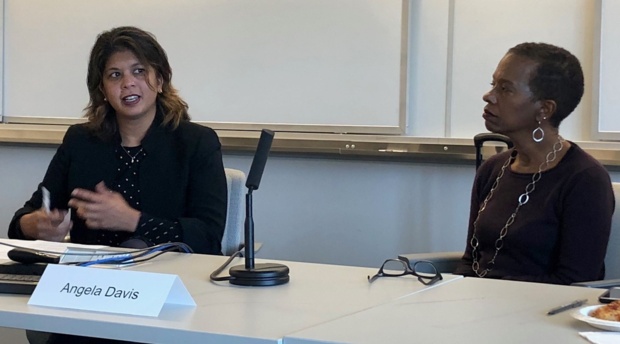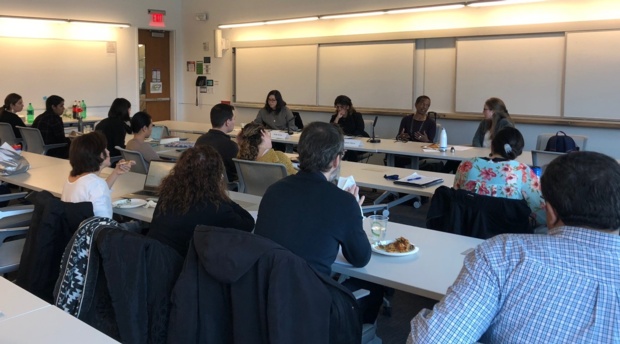Professors Angela Davis and Anita Sinha Examine Law Enforcement Through the Human Rights Lens
February 6, 2019

On Feb. 6, 2019, American University Washington College of Law’s Center for Human Rights and Humanitarian Law hosted “Law Enforcement Through the Human Rights Lens,” a discussion on how courts determine a police officer's use of force, how these cases are investigated, why outcomes tend to favor police officers, and how lethal police force in the U.S. is viewed through international human rights standards.
Members of the Center’s Student Advisory Board were joined by Assistant Professor Anita Sinha, director of the International Human Rights Law Clinic, and criminal justice expert Professor Angela J. Davis, editor of Policing the Black Man: Arrest, Prosecution, and Imprisonment.
“The Supreme Court basically set the standard for when police officers can use deadly force,” Davis said. “Starting with Tennessee vs. Garner, where the Supreme Court held that police officers may use deadly force against a fleeing felon as long as they have probable cause to believe that individual is a threat to the safety of the officer or others. That’s a very general standard that can be interpreted very broadly.”
Since then, Davis said the court has made it easier for police officers to use lethal force by holding in subsequent rulings that such force is not a violation of the Constitution.
“But the Supreme Court doesn’t set the ceiling, they set the floor. If an individual police department wants to set a higher standard for when police officers can use deadly force, they can,” she said.
Sinha agreed, and cited standards included in a report from Amnesty International that recommends the U.S. incorporate a United Nation’s instrument, “Basic Principles on the Use of Force and Firearms by Law Enforcement Officials.”

“One of the key principles is that law enforcement officials, in carrying out their duty, shall, as far as possible, apply non-violent means before resorting to the use of force and firearms,” Sinha said. “State legislatures can use international human rights instruments like this to enforce better laws.”
Investigations into an officer’s deadly force are often conducted by the police departments themselves, Davis said, or by a prosecutor that has an existing relationship with the department – leading to a conflict of interest. Possible solutions include requiring a special prosecutor or an independent prosecutor from another jurisdiction to step in, she said.
On the rare occasion that charges are brought against the officer, he or she is almost always acquitted, Davis added.
“What I believe is happening is that the officer will get on the stand, and even if there is a video of him shooting a person who is running away, he will say ‘I was in fear for my life,’” she said. “But jurors don’t have to credit a witness’s testimony – they can use their common sense. They can say ‘that doesn’t make sense.’ They don’t have to believe everyone that testifies.”
There is continuous advocacy in the U.S. that is pushing to make police brutality a human rights issue, Sinha said.
“Sparked by [the killing of Michael Brown in] Ferguson, grassroots groups have used international human rights norms to raise awareness around this issue and advocate for U.S. standards to be in compliance with international standards,” she said.
Davis noted such local and state level advocacy, and involvement in elections that impact mayoral and ultimately police chief selections, are a few ways law students can influence change.
###
The Center for Human Rights & Humanitarian Law was established as part of American University Washington College of Law’s long-standing commitment to international human rights and the rule of law. For over 25 years, the Center has worked with students, faculty and the international legal community to provide support for human rights initiatives in the U.S. and around the world through teaching, scholarship and service.